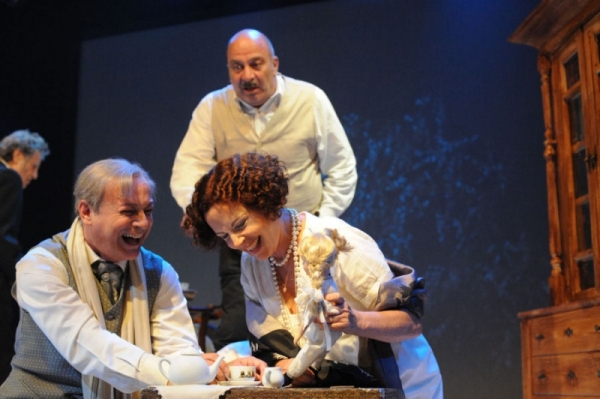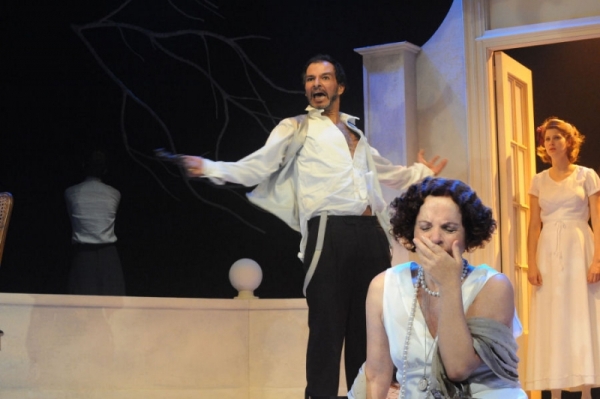
The Khan Theatre production of Chekov’s The Cherry Orchard, directed by Miki Gurevitch, is luminescent in its simplicity. The classics tend to induce anxiety accompanied by a desperate search for relevance or a compulsion to reinvent, and neurosis is not always a source of good theatre. Happily, this production is symptom free.
The burden of classics is simple and unavoidable: everyone knows The Cherry Orchard; even people who don’t really know it think they know it. Amid the celebrations and reunions, as the household and neighbors joyfully welcome Ranevskaya (Liora Rivlin), who is returning home after a five year sojourn in Paris, we are waiting for the axe to drop, and it will. What’s worse is that we know she will do absolutely nothing about it. And yet, we care. Why?
The acting is unstrained, uncluttered, and free of mannerisms, as is Rivka Meshulach’s translation. It is as if Chekov’s text has been absorbed into the actor’s bodies and minds, and when they speak, the words emerge naturally, as they would in any conversation, creating a sense of intimacy. So much is conveyed in the small nuance of each gesture: the half-smile, with just a hint of flirtatious warmth that flutters around Ranevskaya’s lips when she is greeted by Lopakhin (Yossi Eini) expresses the patronizing attitude of landowner to serf, acknowledging his admiration as her due, the desperate thrill of an older woman (who has recently been spurned by her lover) in her ability to attract a younger, virile man, and the comfort of nostalgia, Lopakhin is also a reminder of the past, and happier times.
The simplicity and lucidity of the delivery allows Chekov’s text to unfold, without attempting to bridge or deny the distance between the text and a contemporary audience, the resulting dissonance a subtext – a multi-voiced discourse between the audience, Chekov, the performance and history.
The set and costumes (designed respectively by Svetlana Breger and Judit Aharon) reflect a similar uncluttered approach, eschewing naturalism and relying on a few touches – a sheet-covered bookshelf, candlelight, a flowing white dress and furs, to evoke the feeling of a bygone era and a family immobilized in the past.
The widowed Ranevskaya has lost her wealth and the debts are so high that the family home and surrounding cherry orchard are to be auctioned. Ranyevskaya in her white dress and her brother Gaev romp like children, preferring to spend their time in the old nursery of their home or going out for extravagant luncheons. Lopakhin, the peasant turned successful businessman, offers his own solution to her debt – subdivide the orchard and turn it into vacation homes for the new, emerging middle class. In the meantime, this man of action, who once read a book but didn’t understand a word of it, cannot bring himself to propose to the woman he loves – Varya (Orit Gal), Ranyevskaya’s adopted daughter/housekeeper.
Despite the various unrequited and unconsummated loves that abound in this play and the looming threat of losing the family home, the play is full of humor. The unfortunate Yepikhodov (Nir Ron) is delightful from the moment he first tangles his squeaky boot in the sheets covering the furniture, Charlotte the governess (Florence Bloch) is a moody, flamboyant, magical outsider in this family scene, Yasha (Liron Baraness) is enjoyably nasty as the opportunistic, social climbing manservant and Dunyasha (Nili Rogel) is splendidly foolish and giddy.
Listening to the impassioned speeches of the eternal student Petya (Vitali Friedland) talking about the value of work stirs the heart, even as the history of the twentieth century invites our cynicism. The loyal old servant Firs (Avi Pnini) is a reminder that beneath the gossamer of nostalgia there are treasures of the past – craft, knowledge, skills – lost forever. The gap between ideals and their realization, desire and its fulfillment – this is where the tension lies and the actors convey it to perfection. Amid the laughter, picnics and circular conversations you can almost lull yourself into thinking that nothing is happening, and the thunder, when it comes – in the form of Lopakhin – is all the more potent. Yossi Eini conveys Lopakhin’s character and the changes he undergoes, with complexity, sensitivity and the brute force of destiny.

The characters are incapable of taking action on what matters most to them. No one does anything (well, almost), yet events altering the lives of individuals, and the course of history, happen anyway. The Cherry Orchard raises questions regarding our relationship to the environment, the way we balance conflicting needs, and the way our actions (and inaction) determine the future; questions that remain unanswered in our own time, many years after Chekov. Perhaps in trying to comprehend their passivity in the face of a changing and often threatening reality we can come closer to understanding, and perhaps even resisting our own.
Performances take place at the Khan Theatre, 2 David Remez Square, Jerusalem. Upcoming shows are February 14 – 19, 2011, for a full schedule and times consult the Khan Theatre website. Tickets may be ordered online (in Hebrew) or call: 02- 6303600.
The Cherry Orchard by Anton Chekov, translated by Rivka Meshulach
Directed by Michael Gurevitch
Set Design: Sventlana Breger; Costume Design: Judit Aharon; Music: Roy Yarkoni; Lighting Design: Roni Cohen; Choreography: Marina Beltov
Actors: Leora Rivlin – Ranevskaya; Shimrit Lustig – Anya; Orit Gal – Varya; Erez Shafrir – Gaev; Yossi Eini – Lopakhin; Vitali Friedland – Tropimov (Petya); Arie Tcherner – Simeonov-pishchik; Florence Bloch – Charlotta Ivanovna; Nir Ron – Yepikhodov; Nili Rogel – Dunyasha; Avi Pnini – Firs; Liron Baraness – Yasha; Arie Tcherner – passer-by.
AYELET DEKEL






Comments are closed.